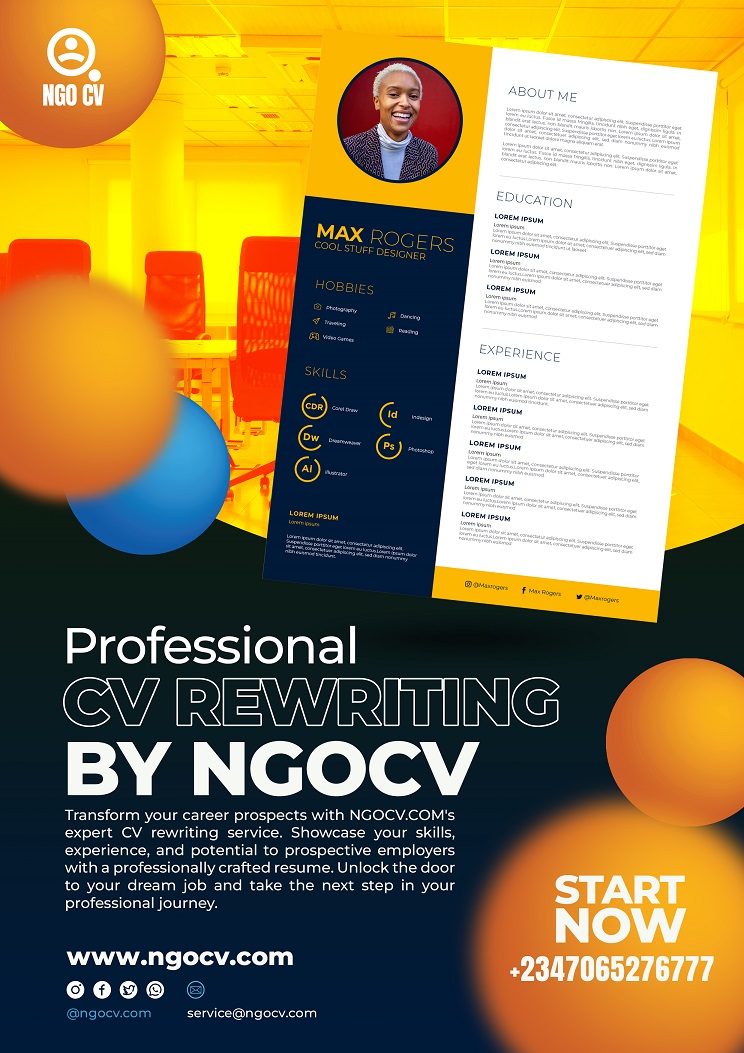United Nations High Commissioner for Refugees (UNHCR) was created in 1950, during the aftermath of the Second World War, to help millions of Europeans who had fled or lost their homes. We had three years to complete our work and then disband. Today, over 65 years later, our organization is still hard at work, protecting and assisting refugees around the world.
We are recruiting to fill the position below:
Job Title: Assistant Development Officer
Job Requisition ID: JR2313886
Location: Abuja, Nigeria
Job type: Full time
Hardship Level: C
Staff member / Affiliate type: UNOPS LICA8
Target Start Date: 2023-04-01-07:00
Nature of the Position
- Nigeria is a country of origin, transit, and destination for refugees, IDPs, returnees, and stateless persons. As of December 2022, Nigeria hosts almost 3 million IDPs due to ongoing internal conflicts and over 93,000 refugees and asylum seekers.
- UNHCR provides protection and assistance to refugees under the leadership of the Government of Nigeria at Federal, State, and Local levels, including support to access basic social services and livelihoods, while also focusing on capacity building, partnership and advocacy with relevant line Ministries, Department and Agencies (MDAs).
- The Government of Nigeria allows refugees free movement, the right to work and access to basic social services such as health and education in the local hosting communities, establishing open settlements, unlike closed camp settings. However, the situation of basic services in the local communities is stretched, even before the arrival of refugees.
- The influx of refugees into local communities has increased the pressure on education, health, WASH, and other community services.
- Livelihood opportunities among the Cameroonian refugee population have been minimal leaving refugees in the Settlements heavily dependent on humanitarian assistance and those in host communities heavily reliant on their hosts.
- More needs to be done in the refugee-hosting communities across the States hosting refugees to address gaps with a framework that provides comprehensive refugee response.
- Following the adoption of the Global Compact on Refugees by the UN General Assembly in December 2018, Nigeria has commenced the development of a national pathway for the implementation of the Compact. In demonstration of its strong commitment to inclusion of refugees, IDPs, and returnees, and supporting the objectives of the GCR, at the Global Refugee Forum in 2019 Nigeria pledged to:
- Include refugees, IDPs and their host communities in their national government development plans
- Strengthen its protection capacity
- Ensure availability and access to durable solutions for refugees and IDPs
- Continue playing an active and constructive role in regional and sub-regional efforts to address the root causes of displacement.
- The pledges have been followed up by the development and validation of a GCR Roadmap for the Implementation of the GCR in Nigeria.
- Progress has been made particularly towards the inclusion of refugees into National Development Plans and service delivery systems; and area-based approaches, including support to host communities; and collaboration with development actors, financial institutions, private sector, among others. In line with the GCR, acting as catalyst UNHCR engages various stakeholders, including humanitarian, development, private sector, civil society organizations, and academia, to collectively address the problems of refugees and ease pressure on communities hosting them.
- Nigeria is also host to approximately 3 million IDPs due to insurgency by non-state armed groups (NSAGs), communal clashes, farmer-herder and other conflicts occurring in the country. As people flee the conflicts and seek refuge in neighbouring countries through multiple displacements, internal displacement, cross-border and return movements are closely interrelated.
- Nigeria pledged at the GRF 2019 to strengthen its protection capacity by ensuring the domestication and implementation of the African Union Convention for the Protection and Assistance of IDPs in Africa (Kampala Convention) by 2023. Nigeria is also a focus country under the Secretary General’s Action Agenda for Solutions to Internal Displacement
- Under the broad headline of Development Solutions for Displacement, which is exemplified through the application of the GCR and the Solutions agenda for IDPs, the role of the Assistant Development Officer is to support the Senior Development Officer (SDO) and the Senior Protection Officer (SPO) to advance UNHCR’s engagement and cooperation with host Government, UNHCR and other stakeholders.
- The goal is to assist local communities and UNHCR’s population of concern by supporting the protection environment and leveraging partnerships to influence policy dialogue to enact institutional reforms toward improved protection, socio-economic inclusion, and self-reliance, taking into account and reducing the vulnerabilities of forcibly displaced persons.
- The Assistant Development Officer will contribute to UNHCR’s support to the Government of Nigeria in operationalizing Global Compact on Refugees (GCR). This entails working on a whole-of-society approach and engagement with humanitarian and development partners, the private sector, and other stakeholders.
- Stateless/at risk groups have often been excluded from development projects, contributing to their further marginalization and violation of their basic rights. As the 2015 SDGs targets indicates that eradicating statelessness is incorporated into global development aspirations; the incumbent will also contribute to opening more space for stateless/at risk populations in national development processes.
- As such, the incumbent needs to have practical experience from, and an understanding of, development programs and processes, the interplay of different aspects of economic growth, governance, fragility, and conflict. Expertise in social protection, local governance, community development and private sector outreach is desirable. The incumbent needs to be able to integrate his expertise with the regular UNHCR programming, working across functional units of protection/programme and field-based teams.
Duties
- Assist in commissioning and/or conducting practical research and analysis to interpret long-term political, economic and social trends that will enhance opportunities for solutions, resilience and inclusion for populations of concern to UNHCR as well as more sustainable approaches to refugee protection.
- Help ensure evidence generated from analytical and advisory services needs to be translated better into context-specific policy dialogue, project design, and programming.
- Assist in planning for resilience and inclusion with a clear shared vision of longer-term protection and solution outcomes for people of concern that takes account of host communities and leverages the roles, resources and capacities of development partners, including Multilateral Development Banks, and Bilateral Development agencies and donors.
- Support the facilitation of the development of comprehensive multi-year transition plans/strategies (incl. Multi-Year Multi-Partner Strategies) for Persons of Concern to UNHCR and/or facilitate the inclusion of populations of concern into national and local development planning and programming instruments.
- Support the identification, strategic articulation and capitalization of development and resilience opportunities, including through Government pledges and or pledges made by bilateral or multilateral development and/or peacebuilding partners.
- Assist in facilitating relationship building with development co-operation agencies and peace and state-building agendas through the different stages of policy and programme identification, preparation, implementation and review.
- Support the development of partnerships and networks with development actors to influence the policy dialogue with governments on institutional arrangements related to sectors, locations and programme content of consequence to UNHCR and persons of concern.
- This would, in particular, focus on supporting the coordination of the in-country relationship with the World Bank and other multilateral development banks, especially where there is potential for specific funding directed towards UNHCR¿s persons of concern (e.g. WB IDA sub-window for refugees and host communities or the WB Global Concessional Financing Facility).
- Support the cooperation with development partners to assist them in incorporating the concerns of refugees, returnees and others of concern to UNHCR into the design and implementation arrangements of projects and interventions in a manner that impacts positively on protection circumstances.
- Support the operation to ensure that development actors are provided relevant data to inform their planning, programming and advocacy around resilience for and inclusion of UNHCR persons of concern.
- Support the facilitation, coordination, collaboration and the sharing of knowledge and experience between UNHCR and development actors and across UNHCR operations globally by documenting and disseminating good practices and active participation in the Division of Resilience and Solutions¿ Development Partnerships Community of Practice.
- Support training activities aimed at the capacity building of UNHCR and partner agency staff to achieve greater coordination, effectiveness and synergies between humanitarian and development interventions.
Requirements
Candidate should have the following:
- Holder of Undergraduate Degree (equivalent of a BA/BS) in Social Sciences, Socio-Economic Development, Development Planning, Rural Development, or other related fields.
- At least six years (5 years with graduate degree (equivalent of a Master’s)) of previous job experience relevant to the function, both in humanitarian and development contexts. Experience in similar settings is essential.
- Preferably with knowledge of, or experience in, local or area based economic development, direct engagement in a technical sector such as education, WASH, social protection, health, energy
- Demonstrated ability to develop and maintain partnerships with a variety of actors – including government and private sector.
- Proven experience in planning, implementing, and monitoring programmes and projects.
- Excellent drafting, presentation and reporting skills, including strong advocacy and negotiation skills in situation involving multiple actors and diverse interests.
- Knowledge of protection, refugee matters and UNHCR’s mandate.
- Excellent computer skills including excel, word and power point.
- Excellent English language skills, including drafting and research capabilities.
- Previous experience of working with development agencies or private sector.
- Experience of working with national governments on development planning.
- Experience of working on forced displacement issues, including with host communities in the country.
- Previous exposure and experience of working with synergies between the humanitarian-development nexus.
- Experience in resource mobilisation.
Minimum Qualifications:
- Years of Experience / Degree Level For P1/NOA – 1 year relevant experience with Undergraduate Degree; or no experience with Graduate Degree; or no experience with Doctorate Degree
Field(s) of Education:
- Development Economics; Development Studies; Socio-economic Development; International Relations; Political Science; Law; or other relevant field.
Application Closing Date
15th March, 2023.
How to Apply
Interested and qualified candidates should:




